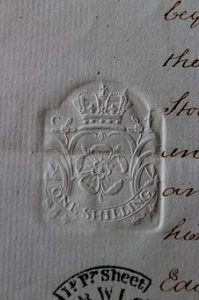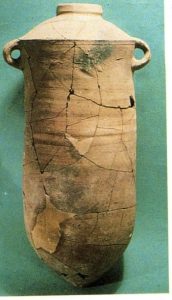
An unusual wedding
The marriage in Cana of Galilee (Joh. 2, 1-12)

In former times, when a king sent an ambassador to a foreign land, he always gave him a credential. That has remained so today. Any diplomat entering the service abroad submits such a letter to the government of the country in which he works. Maybe someone asks now what that has to do with the wedding to Kana? Well, the account of it marks the beginning of the activity of Jesus, one could also say his „Date of beginning„, and I means, it represents something of a credential of the Lord of Lords, the Father of Jesus Christ, who is here given to the people of God , Here we find out what Jesus came for.
When
The first thing that stands out is in the first 4 words: And on the 3rd day. Actually, it should be here: on the 4th or 5th day. Let’s look back:
The first day is about the testimony of John the Baptist about himself (John 1: 19-28). V. 29: The next day, the second day, Jesus is baptized by John. The third day begins in v. 35 and ends in verse 39. Verse 43 speaks again of a next day. That would be the 4th day! So if this says: on the 3rd day, then something else must be meant other than the days, which are mentioned here.
Two possibilities of interpretation are revealed here: The first goes back to the third day of creation. God separated the water from the dry land and called the collection of the sea water. Now, in the last book of the Bible, Revelation, the sea is used as a picture for the peoples of the world. Seen from here, Jesus would be represented here as the creator of man. That would be a possibility of interpretation, but the 2nd seems to me to be more essential. It also appears in a special light in the context of verse 11, which concludes the report. There it is:
This is the first sign that Jesus did … and he revealed his glory.
Every Easter we hear these 3 words: on the 3rd day and because this 3rd day took place, today we celebrate the day of rest which God used in creation as a day to his glory no longer on the 7th day of the week but on the 1st day; because what happened on this third day happened on the first day of the week and is so important to every person that it will be preached to the end of the world: Jesus is risen from the dead!
Can there be a greater revelation of the glory of Jesus than that which happened on the third day when his victory was manifested even over death? Jesus wants to celebrate a wedding with us and on this third day he has created the conditions for it. Only now is communion with Jesus and thus with the living God possible.
Now the answer that Jesus gives to his mother also appears in a completely different light. When he says: my lesson has not come yet, and then seems to act contrary to his words, then the question arises how it is to be understood. Jesus is not a human who says yes and does not mean or who says otherwise than he means. No, everything that Jesus does or says has its meaning and corresponds to the truth. Again, this is no different. Jesus‘ hour has not come yet, because the third day was not yet.
John 13:1 „Now before the feast of the passover, when Jesus knew that his hour was come that he should depart out of this world unto the Father, having loved his own which were in the world, he loved them unto the end.“
Here Jesus‘ hour is exactly outlined. It does not mean the period of 60 minutes, but the time, which is between Good Friday and Easter, or Ascension. The hour of Jesus, that is the hour of reckoning with Satan, the liar and deceiver from the beginning. When Jesus exclaimed on the cross, „It is finished!“ Satan was defeated, and all the shields were atoned for. When Jesus rose from the dead, it was the confirmation of his victory of the highest authority, and thus Jesus‘ hour was completed successfully.
What Jesus does or says here at the wedding in Cana, therefore, finds its fulfillment only after his resurrection on the third day.
Where
The wedding takes place in Kana. Kana, translated means reed, and the reed is at the same time a picture for the fickle, weak. It is a picture for those who need help. To whom do not fall the words of Isa at this thought? Isaja 42.3: „A bruised reed shall he not break,

and the smoking flax shall he not quench: he shall bring forth judgment unto truth.“
“ They that are whole need not a physician; but they that are sick.“
That’s Jesus! And so he wants to do it in our, in your and my life. For him, there is no hopeless situation. Fritz Woike (1890-1962) says it this way:
Where human paths end,
God’s way begins first.
Who turn all ways
and steer worlds.
Where human power vanishes,
only God’s power begins.
His power releases
where our power dissipates.
He can speak his word of power,
only in the deepest need,
if everything is going to break
and sinking threatens.
Only when we completely lost
and poor and helpless,
to us from God’s gates
the angels of God go.
How fog must melt,
what we are all wrapped up in,
God can only start there,
where we are at the end.
Now we appear. First of all: Our wine (1), that is our spirit is not enough for the wedding celebration with Jesus. He is too little, he is too bad! A crushing verdict, and that is quite terse: and when the wine went out. As if it were a matter of course. It is not a matter of course but a disaster! And it is also a disaster for us when it says: it is not enough. I am thinking of the parable of the 10 virgins (2). The five who were told that they did not have enough were left out. They could not go in for the wedding, that is, excluded from the kingdom of God, no future, forever lost! If it is said here at the wedding to Kana the wine is not enough, then the Lord wants to tell us through this: What is in your life, no matter what and how much, is not enough for the kingdom of God! Your life ends in disaster and this applies to all without exception and so self-evident that it is almost incidentally mentioned here. But thank god! We do not have to stop here. It goes on. Now Jesus comes into action. Now comes the gospel, the good news, the salvation is there.
First of all, there is someone who points out to us Jesus, Mary who speaks: „What He says to you, that does.“ For those who get involved, the adventure begins life for them.

As
Six stone water ewers stand there. Why just 6? Why water ewers? Does Jesus need such a thing? If you look up the Bible in the lexicon, then there is the number 6:
After the 6 count the days and years of human labor that lie between the Sabbaths and Sabbath years sanctified by God, as well as the days of the divine work of creation.
Paul uses the image of empty vessels as a picture for man. He says: there are vessels of wrath and vessels of mercy! (Romans 9:22 ff) and then goes on to say that God has called us to be vessels of mercy. That’s exactly the point here.
So we have 6 water jugs here. In each went about 100 liters of water. They were filled once. Like our life: filled from Sabbath to Sabbath, from day of rest to day of rest. And with what our life is not filled everything: with work, with ideologies, intuitions, plans, ideas, etc., etc. Everything without Jesus, for so far Jesus had not appeared yet. The water jugs of our lives were filled in their own, human direction. But now the jugs are empty, in the end.
This is a bad time, when our lives are empty, when we are finished with our wisdom, when we do not know any more advice, when we feel helpless and useless, because an empty life is like an empty jug: turned off or cornered ‚Nobody takes any notice of it, in a nutshell: worthless.
At the same time, however, this life, like the empty jug, offers a great opportunity: it can be refilled. Only with what? Again with the same as before? To end up at the same point as before? If this happens a few times, the desire for it passes thoroughly, he just does not like it anymore. There is only one thing: Jesus has to fill the empty jars, that is, our lives, our time! And HE likes to do it. He says:
„I have come that they may have life and fullness“ (John 10:10).
Water has cleansing power, even in the imagery of the New Testament. This makes it clear that before Jesus does anything else, he cleans a person once, thoroughly. Here is not saved with water, no here excessively poured out, so that nothing remains of the old guilt:
„When the Son frees you, you are quite free.“ (Jesus in John 8:36)
If it says here that the pitchers are filled to the top or even to the overflowing, it means to us that the Lord wants to penetrate our lives completely with his spirit, that he wants to fill us with his Holy Spirit so that he overflows to other people, so they notice. „He that believeth on me, as the scripture hath said, out of his belly shall flow rivers of living water“, so says Jesus in John 7:38.
Now it does not mean: it is not enough, no, now there is enough for the party. The catastrophe is averted – no more: no future, no future, no hope, but: life in abundance, God bless – every day new! Just as a well is constantly bubbling up fresh water, so God wants his blessing to flow in our lives.
The Lord gives us so much blessing, so that we can hand it over: „Draw now and bring it to the food-master,“ he says.
Jesus made our life from scratch, so to speak, from within. Externally we are still the same, the old water jugs are still there, but they have a new content; and of it should now be scooped. Only then will the whole miracle that the Lord has done become visible. The servants did nothing with water jugs except what they always did: they filled them with water; the only difference: this time Jesus gave the order. And now, by doing what he tells them, to take from what seemed so commonplace in the water jugs and thus to go to the dining master to try it, the miracle is obvious, since all involved in the amazed. Have not some wonders been revealed to us because we did not go by faith?
Actually, this is the total nonsense to offer someone water and pretend it’s wine. You have to do that, it will be fun for the audience. I would like to know how the servants were doing. „What will the dining master say if he tried? We’re going to fly out of octagonal, he’ll think we’re going to hug him, and the others, they’ll laugh half-dead when they see that. „
Such or similar thoughts may well have moved them in their hearts as they went to the food master. This is the venture of faith. Faith always counts on the action of the Lord Jesus, and he works or is active on behalf of the Lord. This is something exciting, and sometimes our hearts beat us, as they say. It is not always the case here that something is humanly impossible, but we always count on God’s intervention; and he keeps what he promises if we act only on his behalf.
Ps. 33: 4: For the word of the Lord is true, and what he approves, he certainly holds.

The servants learn here too. Now they are at the dining master. Now they offer him the water to taste. What will happen now? He takes a sip and – his face brightens, his eyes are quite big. That can not be true, such wine, where did you get that? Why did you hold it back for so long, you should have served it first! Yes, that is noticeable. What Jesus gives is what we need, and it is not comparable to what we have, it is much better.
The servants are now asked where they got it from. Whether they have been silent as we often say? Certainly not, it is only hinted here – but the servants knew it – they will have told of Jesus, on whose behalf they filled the pitchers and who sent them with the wine, which was water. Joy comes to the servants, joy over what they have experienced, joy to be the henchmen, the transmitters of this miracle. This is always the case when we let Jesus use us: first palpitations, then joy. We experience Jesus as the living Lord, who shapes our lives and thus also becomes and experiences for others.
But to the dining master, what he experiences here is so incomprehensible that he calls the groom and asks why the good wine is just coming, and he gives it a rating: usually uncommon, then low, then good. This is our life before God: just as usual as with all others, like everything that existed until then. In the eyes of the food master, as well as in the eyes of the others, perhaps quite well, but God has other standards. With him that is too low, because it is detached from him. It exists without asking for it, without its standards. But then, after Jesus came into our lives, it gains a new quality: the water becomes wine. This has an impact on our entire environment. Our life will be good before God.

The wedding at Kana is a representation of what Jesus wants, to make our lives new, from the ground up and from the inside out, not the other way around. It’s a description like in fast motion. Especially the latter, that our life is getting better, better than a life without God, does not usually happen overnight. It will gain in quality as we open up to Jesus. The more areas of life we control and let determine by Jesus, the richer our lives will be. Streams of living water are to flow from our bodies, so Jesus said (John 7:38). By implication, as it were drop by drop, this happens right at the beginning of a life with Jesus, and becomes more and more, the more this Lord gains space in our lives, until then, that a life full of Him overflows like a broad current.
To the woman at the Jacob’s well Jesus says:
But whosoever drinketh of the water that I shall give him shall never thirst; but the water that I shall give him shall be in him a well of water springing up into everlasting life. (John 4: 14).
So Jesus reveals his glory; a glory in which we all are allowed to participate and which appeals to others. And his disciples believed in him. You also?
Endnotes
1. Lexicon on the Bible: In the figurative sense, wine is a common image for spiritual powers and gifts
2. Matthew 25: 1-13: